Oct 6, 2025. Meeting with RAND Corporation and U.S. Department of Defense
Hello. Today, Sunim had scheduled meetings with Dr. Oh, Miyeon, Korea Policy Chair at RAND Corporation, and Nina from the U.S. Department of Defense.
Sunim began his day at 5 a.m. with practice and meditation.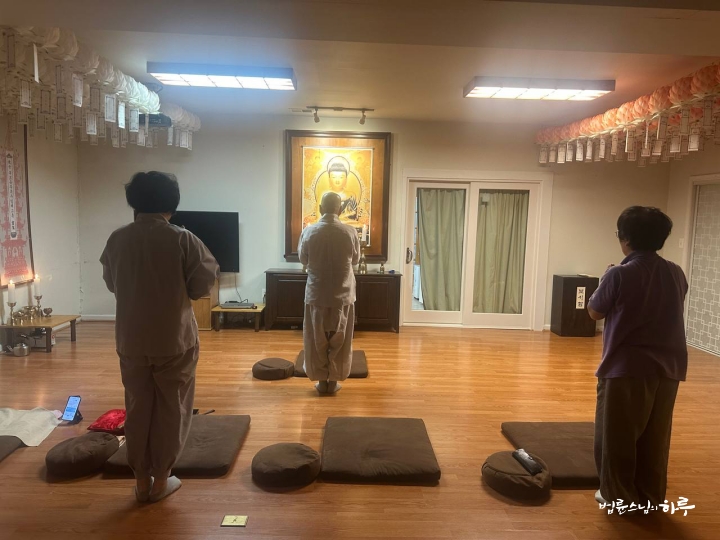
Due to the ongoing U.S. government shutdown, the morning visit to the State Department was canceled. Instead, Sunim spent the morning working and resting at the Washington DC Jungto Center.
At 11 a.m., Kim, Young-ja, a Jungto member from Washington, came to visit him. She expressed her gratitude for being able to participate in the Awakening Retreat in Washington last fall and offered a donation.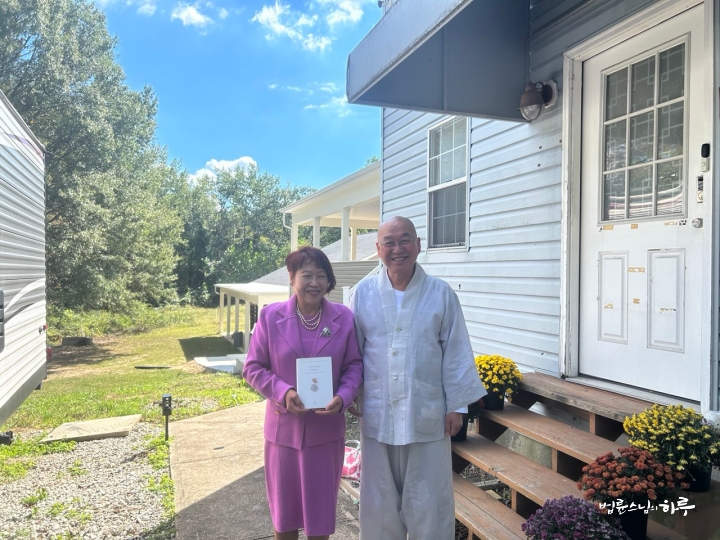
After lunch, Sunim met with Dr. Oh, Miyeon, Korea Policy Chair at RAND Corporation, at Dupont Circle in the afternoon.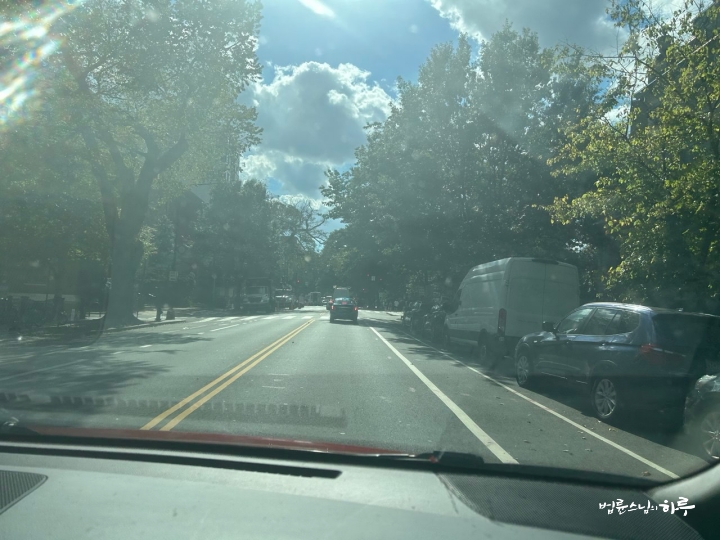
RAND Corporation is a nonprofit research institution established in 1948 through collaboration between the U.S. Air Force and Douglas Aircraft Company, created to support defense and security policy through scientific analysis. Regarding the Korean Peninsula, it is considered one of the most influential research institutions in the United States, analyzing North Korea’s nuclear and missile threats, the U.S.-ROK alliance’s deterrence strategy, and scenarios for unification and North Korean regime change.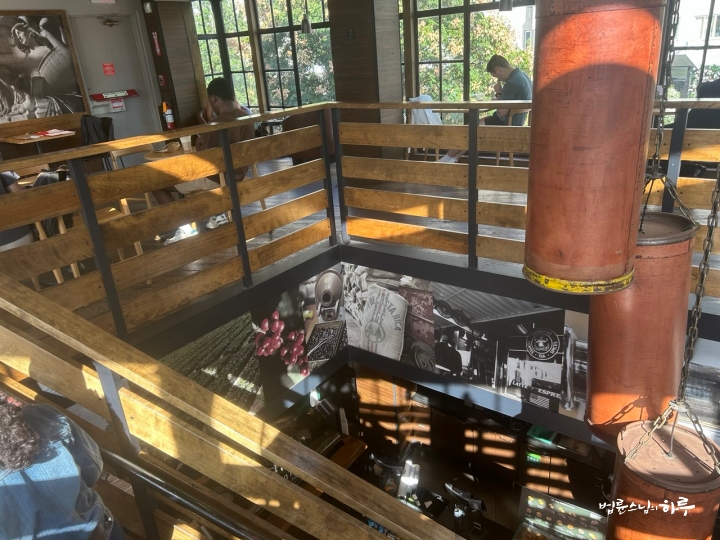
Dr. Oh, Miyeon is responsible for expanding research programs focused on East Asian security and prosperity and U.S.-Korea relations at RAND, as well as mentoring researchers. Sunim had previously conversed with Dr. Oh at The Peace Foundation. After exchanging warm greetings after a long time, they continued their dialogue on peace on the Korean Peninsula.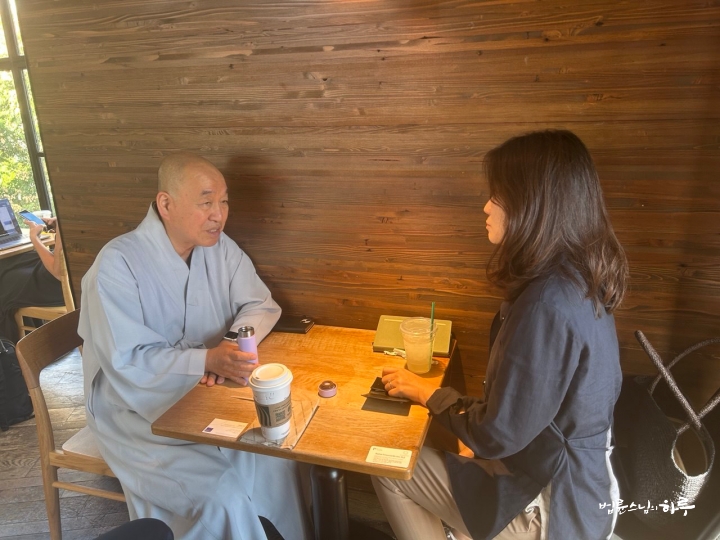
“Our goals are twofold. First, war must not break out on the Korean Peninsula. Second, the suffering of North Korean people must be alleviated, even if just a little. We must view the Korean Peninsula issue from the perspective of war prevention and humanitarian concerns, not from the interests of the South Korean government or any particular faction. While denuclearization has been demanded amid the confrontation between denuclearization and lifting economic sanctions, if denuclearization is realistically difficult, we should move toward preventing proliferation. In setting up the U.S.-Korea relationship, what matters is whether the alliance helps prevent war or not.”
Sunim emphasized the need for practical peacekeeping strategies rather than ideals, then proposed a pragmatic and balanced approach to peace on the Korean Peninsula and normalization of U.S.-North Korea relations.
Dr. Oh sympathized with Sunim’s perspective while carefully pointing out realistic constraints and the complexity of the policy environment. She explained that the current U.S. and South Korean security and policy decision-making structures have become much more conservative and uncertain than in the past. She particularly mentioned the transfer of wartime operational control, modernization of the U.S.-ROK alliance, and North Korean denuclearization as key issues in U.S.-Korea relations, diagnosing that South Korea should respond flexibly to strategic changes within the United States rather than excessively insisting on an independent path. She also agreed with the importance of “continued dialogue” and a “peace-centered approach” that Sunim proposed, saying that the key to resolving the North Korean issue lies in long-term trust-building rather than emotions.
As the conversation concluded, Sunim emphasized once again that “we are raising our voices for peace on the Korean Peninsula,” and Dr. Oh expressed her gratitude, saying such forums for dialogue are exactly what America needs right now. They were able to have an in-depth discussion about the situation on the Korean Peninsula and improving U.S.-North Korea relations for an hour.
After the conversation, Sunim presented Dr. Oh with a signed book. They agreed to meet again during Sunim’s next visit to Washington D.C. and concluded the meeting.
Moving to another location, Sunim met with Nina Sawyer, who works at the U.S. Department of Defense. Good Friends USA had hosted several gatherings for young people in Washington D.C. in the mid-2000s, and Nina Sawyer had participated in those meetings while attending Johns Hopkins School of Advanced International Studies. The connection from when she interned under Keith Luth, who was a professional staff member of the Republican Foreign Relations Committee, and participated in meetings has continued to this day. Having observed Sunim’s activities for a long time, she has deep trust in his work.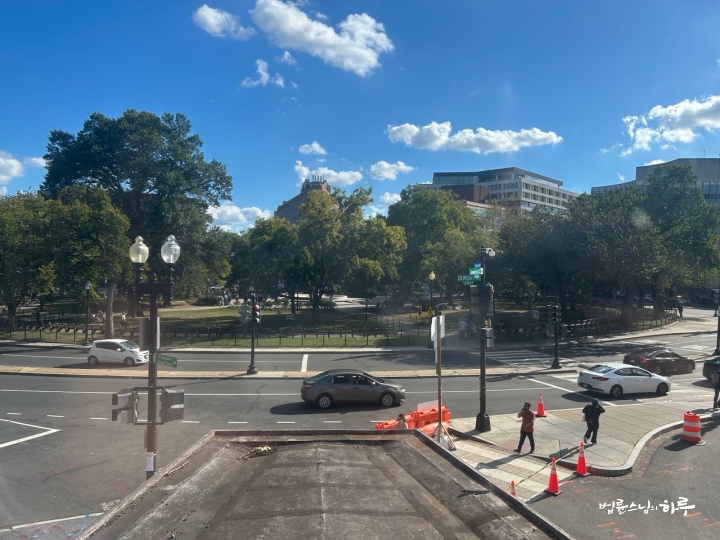
Today’s meeting took place outside the Department of Defense after work. They had discussed preparing a Dharma Q&A lecture for Department of Defense staff last year, but she said it had become somewhat difficult now.
Sunim then discussed various topics including America’s Indo-Pacific strategy and the realignment of the U.S.-ROK alliance, deployment of strategic weapons and nuclear deterrence, and the possibility of war on the Korean Peninsula. He particularly emphasized the need for the United States to go beyond the framework of military security and expand toward humanitarian perspectives and a philosophy of peace. He expressed deep concern about the destruction left by war and people’s suffering, sharing his experiences supporting refugees in Syria and Myanmar.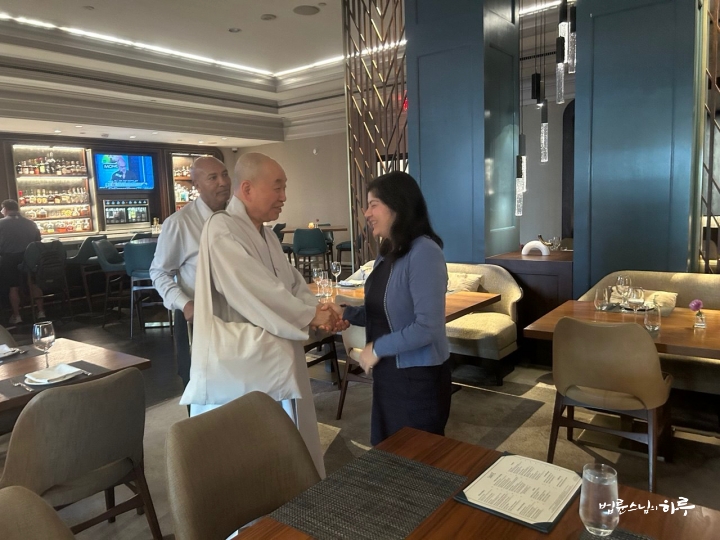
War Must Not Happen for Any Reason
“I am currently supporting post-war reconstruction and refugees. In Syria, we are helping refugees and participating in post-war reconstruction projects. Also, in the Mae Sot area of Thailand, we are supporting Myanmar refugees who have crossed the border. These areas are in a very miserable situation with earthquake damage compounded by civil war. War must absolutely not happen for any reason. I believe the same applies to the Korean Peninsula – preventing war is most important. So while military preparedness is necessary, it’s more important to create a situation where war is unnecessary through dialogue with North Korea. War, whether international or civil, is a tragedy for everyone. If politicians truly care for their people, they must prevent war for any reason. Let’s work together toward that path.”
Nina Sawyer responded that President Trump had said something similar, and Sunim said that although President Trump is causing much confusion in domestic issues, his progressive perspective on peace deserves recognition. After finishing the conversation, Sunim gave her a book as a gift before departing for the Washington DC Jungto Center.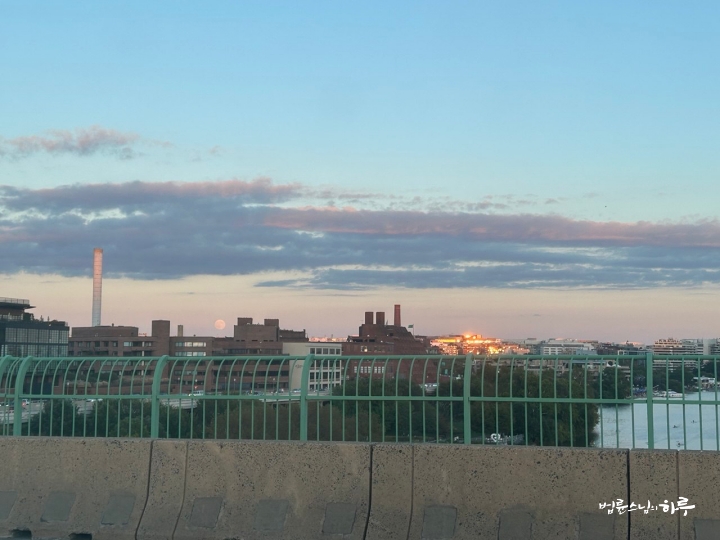
On the way back, they briefly stopped by Jacob’s house to say goodbye and inform him that Sunim would be returning to Korea tomorrow.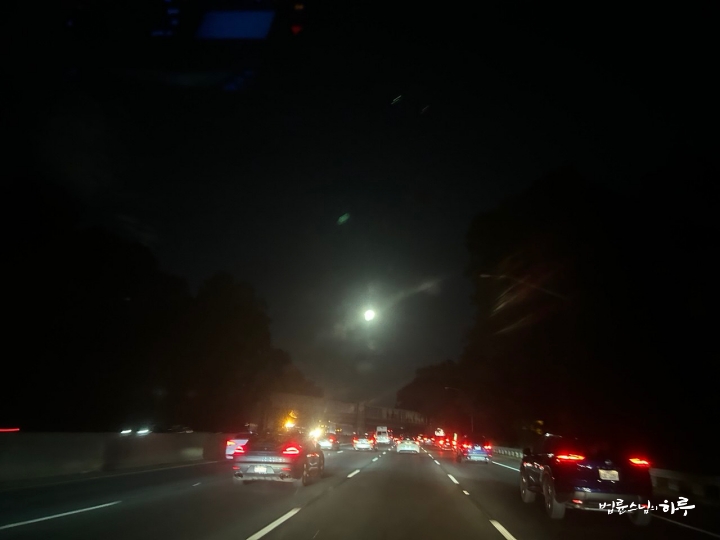
Looking at the sky from the highway on the way back, a round full moon was shining brightly. During his 5 days in Washington D.C. – 3 days last week and 2 days this week – Sunim met with various officials and tirelessly emphasized that war on the Korean Peninsula must be prevented at all costs. Even while looking at the round full moon, he prayed for permanent peace to come to the Korean Peninsula.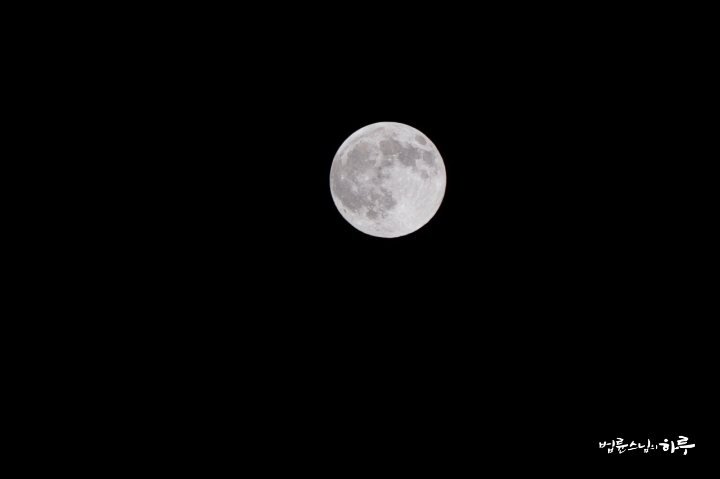
After arriving at the Washington DC Jungto Center at 8 p.m., they had dinner. During the meal, Sunim encouraged Dharma Teacher Beophae and Min, Deok-hong, who had worked hard preparing for the East Coast lectures and Washington D.C. visit schedule, as well as the meditation room construction at the Washington DC Jungto Center. After dinner and discussing tomorrow’s schedule, it was 9:30 p.m. Today’s activities ended relatively early compared to other days.
Tomorrow is Sunim’s last day in Washington D.C. and the day he completes all East Coast activities and returns to Korea. After two meetings in Washington D.C., he will head to the airport in the afternoon, departing from Washington D.C. via LA before returning to Korea.
Since there was no Dharma talk today, I’ll conclude by sharing a dialogue between a questioner and Sunim from the Dharma Q&A held in Houston, USA on the 3rd.
I’m a housewife who lives minute by minute, always busy. Why can’t I ever take a break?’
“If you prefer to stay busy, that’s fine. I’m keeping myself busy as well.”
“Sometimes it’s too hard. I don’t know why I’m living like this.”
“If it’s too hard, then you don’t have to live such a busy life.”
“But if I don’t do things, work piles up.”
“Then do it. What’s the problem?”
“Should I just keep living by the minute like this?”
“I’m also taking flights once a day right now. If I’m tired, I sleep on the plane; if not, I read books. While waiting at the gate, if I’m tired, I just close my eyes and lie down; if not, since there’s internet, I handle work. Like that, rest when you’re tired, work when you’re not. Why are you tired when you’re working hard by your own choice? What’s tiring about doing what you like? Do children say they’re tired after playing games? Even when I was young, country people would gamble in the gambling house from early evening past midnight and still go to work the next morning. Because they did it because they liked it. If it’s work I like doing, what does it matter if it’s by the second rather than by the minute? And really, what kind of minute-by-minute work does a housewife have at home?”
“Housewives are even busier than people think.”
“Your mind must be busy. I’m not saying being busy is bad. If there’s work, it doesn’t matter whether you do it by the second or by the minute. But if it’s hard, then stop. If you can’t stop, that’s a mental illness. It can be called an obsessed state. In that case, you need to go to a psychiatrist for treatment and take some medication.
When you drink alcohol, if you sleep well at night and feel good, that can be called food. But if your body hurts after drinking, you should quit drinking. But if you absolutely can’t quit drinking, that can be called addiction. If you can’t control it with your own will, it becomes an illness. In that case, you need to ask others for help. Either ask a doctor for help, or you need to go to a detention center for forced isolation. Since you absolutely can’t control it alone, you need to go to an alcoholic detention center. Since alcohol can’t be brought in there, you can be controlled even if forcibly. You need to get help this way. Anything that can’t be controlled by your own will is an illness.
Work that I want to do is work I do because I like it, whether I lose or profit, so just do it. If you think it’s not right, then don’t do it. If you think it’s not right but can’t control it well, you need to go to the hospital. If I want to walk but can’t, that’s an illness, right? In that case, you need to go to the hospital and check what’s wrong with your legs.
You can be seen as feeling great psychological pressure right now. You’re being psychologically chased by something. So you’re under psychological pressure that you have to keep doing something. So try not doing anything. Even if you go to a meditation center and sit still for ten days, there’s no problem. It seems like something terrible will happen if you don’t do it now, but there’s no problem if you don’t wash dishes, no problem if you don’t clean the room. It’s fine to clean the room every day, fine to clean every three days. People who clean their room every day think they can’t not clean every day. But you can clean once every 3 days, once every 7 days. Your body is exhausted because you keep feeling pressure due to anxiety.
First, try having the perspective of ‘not doing any housework.’ But you can’t do nothing while at home, right? You won’t be able to control yourself. So just like going to a detention center to quit drinking, try going to a meditation center for ten days. There’s no problem even if you don’t do housework for ten days. If you get sick again after returning from meditation, go to meditation again. If you do this several times, your unconscious will feel that it’s okay not to do housework.
You all experienced this during the COVID pandemic. Until then, Christians thought they absolutely had to go to church on Sunday, and something terrible would happen if they didn’t. Then because of the pandemic, they couldn’t go to church even if they wanted to. At that time, there was no problem even without going to church for a year. Now that the pandemic is over, half go back to church, and half don’t. So these days, pastors are making a fuss about finding lost sheep. About 70 percent go to church, and about 30 percent don’t go to church at all. Then did those people completely abandon Christianity by not going to church? That’s not the case. They all send donations. People who don’t come to church after being baptized are called lapsed believers. Like that, it seems unbearable to suddenly not do what you always did, but if this situation repeats, it becomes no big deal.”
“Thank you. I understand well.”





